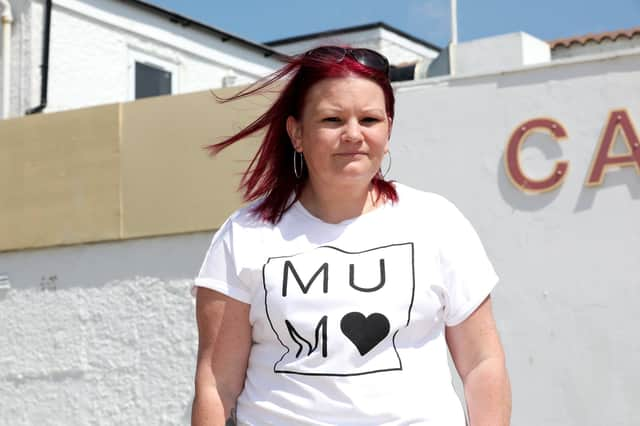Hayling Island mum says fight for bigger council house with Havant Borough Council has left her feeling like ‘disposable rubbish’


Mum-of-three Jodie Neale feels her family is being ignored and ‘treated like rubbish’ by Havant Borough Council
Jodie’s eldest daughter Casey Jo, 20, has combined type ADHD, and her youngest Ellie-Lu, five, is autistic.
Advertisement
Hide AdAdvertisement
Hide AdLexcie, 14, shares a room with her little sister in the family’s two-bedroom property.
Single mum Jodie says she has been battling the council for three years to try and move into a larger council house.
The authority insists that medical needs for additional bedrooms are properly assessed.
As of January there were 1,632 families on the council’s housing waiting list.
Advertisement
Hide AdAdvertisement
Hide AdJodie said: ‘Even with Casey’s full diagnosis of ADHD, Havant council has not been helpful, putting us in the same banding we were in before I gave them all her medical evidence.
‘I’ve got support from my five year old’s paediatric doctor to say that she needs her own bedroom.
‘It’s heartbreaking my 14-year-old has no space ever from the ADHD or autism, and it’s sad my five-year-old has no space for toys for time out.
‘It’s affecting my 14-year-old massively - as Lexcie is autistic she gets up at all hours. So where they’re sharing a room, she’ll wake up at 3am and it’s annoying for a 14 year old.
Advertisement
Hide AdAdvertisement
Hide Ad‘I got a letter from Lexcie’s school counsellors saying it’s been affecting her mental health.’
The 41-year-old mum, who works at Lidl, said the family needs a three-bedroom house, or even a two bedroom with a dining room that could be converted.
She said even though she puts forward support letters from medical professionals, she cannot get the help she needs.
Jodie said: ‘They are being very difficult about where we stand on their Hampshire home choice list.
Advertisement
Hide AdAdvertisement
Hide Ad‘I am finding it really difficult to get this council to help or listen. We’ve been in band three for over three years and I’ve not seen one property suited to our needs in that time.
‘Any support or diagnosis paper I put forward just isn’t good enough.’
The family were taken off the list for a three-bedroom house temporarily when Casey left home during last year.
Jodie said: ‘They just took us off the list like we were literally disposable rubbish.’
Advertisement
Hide AdAdvertisement
Hide AdCasey had to move into supported accommodation due to a lack of space at home, although she wants to move back in with her family.
Jodie said: ‘She didn’t want to leave home. They were forcing my hand to make her stay there.
‘It makes me frustrated to see my eldest live somewhere she doesn’t want to be.’
She added that she has been left feeling ‘depressed’ and ‘constantly worried’ about their housing situation.
Advertisement
Hide AdAdvertisement
Hide AdJodie said: ‘One of the housing officers advised I buy my five-year-old a lava lamp, a mat, some toys and put her in a space. I’m sure if autism was that simple it wouldn’t be a thing.
‘It’s a lifelong disability. It’s not right and it’s not fair. She needs her space.
‘They’re putting out there that they’re supporting people from lockdown, but they’re not, we’re being pushed aside and it’s taking a toll on my mental health.
‘In every way, I’m being ignored.’
The council said it is unable to comment on individual cases, but priority is based on the needs of the household.
Advertisement
Hide AdAdvertisement
Hide AdCllr Gwen Robinson, cabinet lead for housing, said: ‘If there are additional needs to be assessed, such as the need for additional bedrooms on medical grounds, given the demand for family accommodation in the borough, we have to be satisfied that there is a medical need for this, and that it is not possible to manage the medical condition within the current home.
‘To this end we have to gather sufficient information and support from the applicant and medical professionals to make our assessments.
‘In complex cases we may also instruct an independent medical advisor to assist us with making our assessment of need, including what level of priority banding should be considered.’
